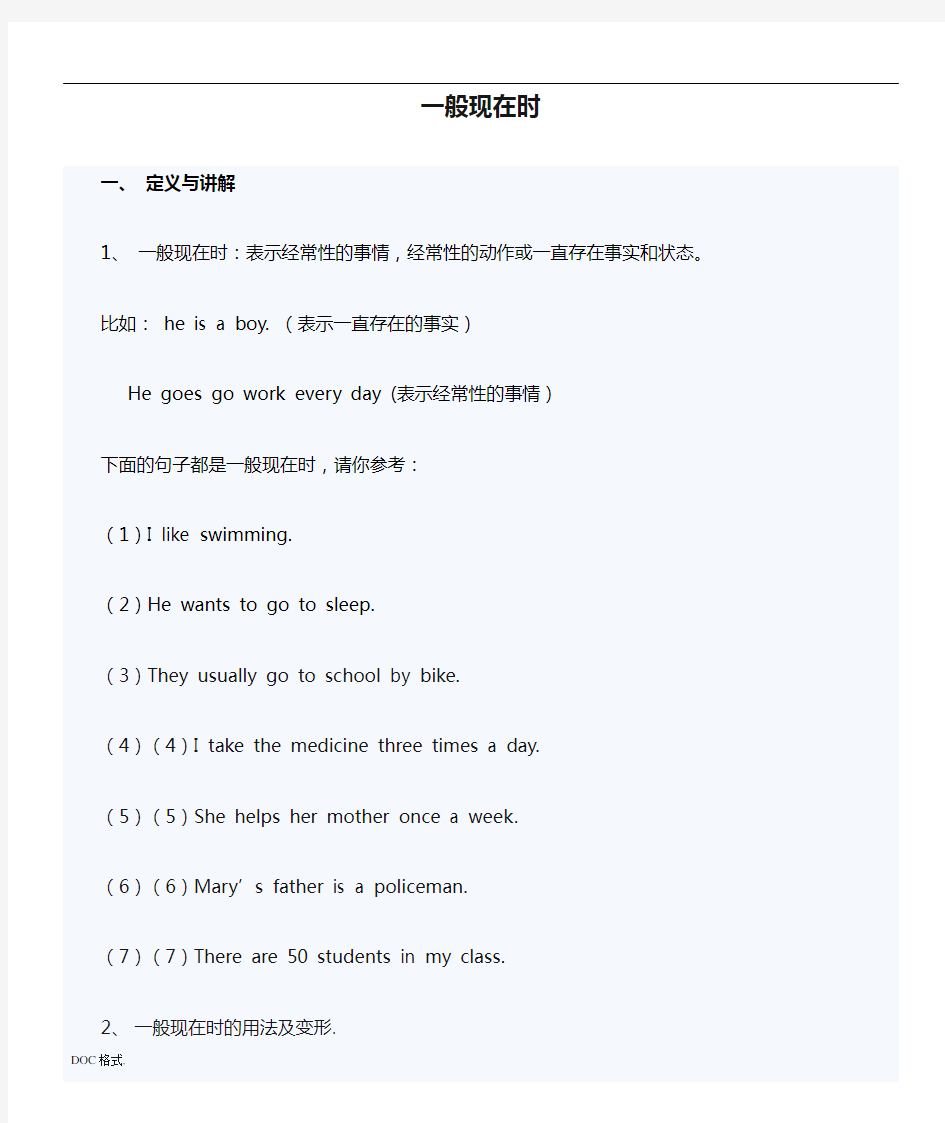
一般现在时和特殊疑问句讲解与练习
- 格式:doc
- 大小:44.00 KB
- 文档页数:7


一般现在时
一、定义与讲解
1、一般现在时:表示经常性的事情,经常性的动作或一直存在事实和状态。
比如: he is a boy. (表示一直存在的事实)
He goes go work every day (表示经常性的事情)
下面的句子都是一般现在时,请你参考:
(1)I like swimming.
(2)He wants to go to sleep.
(3)They usually go to school by bike.
(4)I take the medicine three times a day.
(5)She helps her mother once a week.
(6)Mary’s father is a policeman.
(7)There are 50 students in my class.
2、一般现在时的用法及变形.
一般现在时要注意以下几点:
(1)有am,is,are及情态动词的句型变疑问句调换am,is,are及情态动词和主语的位置,否定回答在am,is,are及情态动词的末尾加not.否定句直接在后面加not.
例如:he is a student. - Is he a student ? - Yes,he is./No, he isn’t.
He is a student - he isn’t a student.
I can ride bike. - can you... I can’t...
(2)有动词的句型变疑问句在句首加上助动词Do,第三人称单数加Does.否定回答在Do或
Does后面加not
例如:I like swimming . - Do you like swimming ? - Yes, i do/ No, i don’t.
I like swimming. - I don’t like swimming.
(3)第三人称单数在动词的末尾要加s或es,以s,ch,sh结尾的单词加es,特殊单词特殊记.
例如:He goes to school at 7:00 every day.
要特别注意在什么情况要使用一般现在时.
现在请你完成一些练习,让你更熟练地掌握一般现在时:
(一).用动词的适当形式填空
1. She _________(go) to school at seven o’clock.
3. He usually ___________ up at 17:00.(get )
4. She ___________ (live) in Beijing.
7. My father __________ (watch) TV every evening .
9.________ Amy _________ (read) English every day
10. Chen Jie sometimes _________(go)to the park with her sister.
(二).选择填空
1.I want____homework now.
A. doing
B. to do
C. to do my
D. do my
2.It's time______.
A. go to school
B. play games
C. to go home
D. to do my homeworks
3.______go and help her.
A. Let's me
B. Let's us
C. Let's
D. Let's to
4.Do they have a new car? Yes,_____.
A .they are B.they have C. they don't D. they do
5.He often _________ supper at 6:00 in the evening.
A. have
B. has c. is having D. is eating
6. We _____________ any Chinese classes on Friday.
A. are having
B. aren’t having
C. don’t have
D. are have
(三)、用括号动词的适当形式填空。
1. He often _________ (have) dinner at home.
2. Daniel and Tommy _________ (be) in Class One.
3. We _________ (not watch) TV on Monday.
4. Nick_________ (not go) to the zoo on Sunday.
5. they _________ (like) the World Cup?
6. What they often_________ (do) on Saturdays?
7. your parents _________ (read) newspapers every day?
8. The girl _________ (teach) us English on Sundays.
9. She and I _________ (take) a walk together every evening.
10. There _________ (be) some water in the bottle.
11. Mike_________ (like) cooking.
12. They _________ (have) the same hobby.
13. My aunt _________ (look) after her baby carefully.
14. You always _________ (do) your homework well.
15. I _________ (be) ill. I’m staying in bed.
(四)、按要求改写句子。
1. Do you often play football after school? (肯定回答)
2. I have many books. (改为否定句)